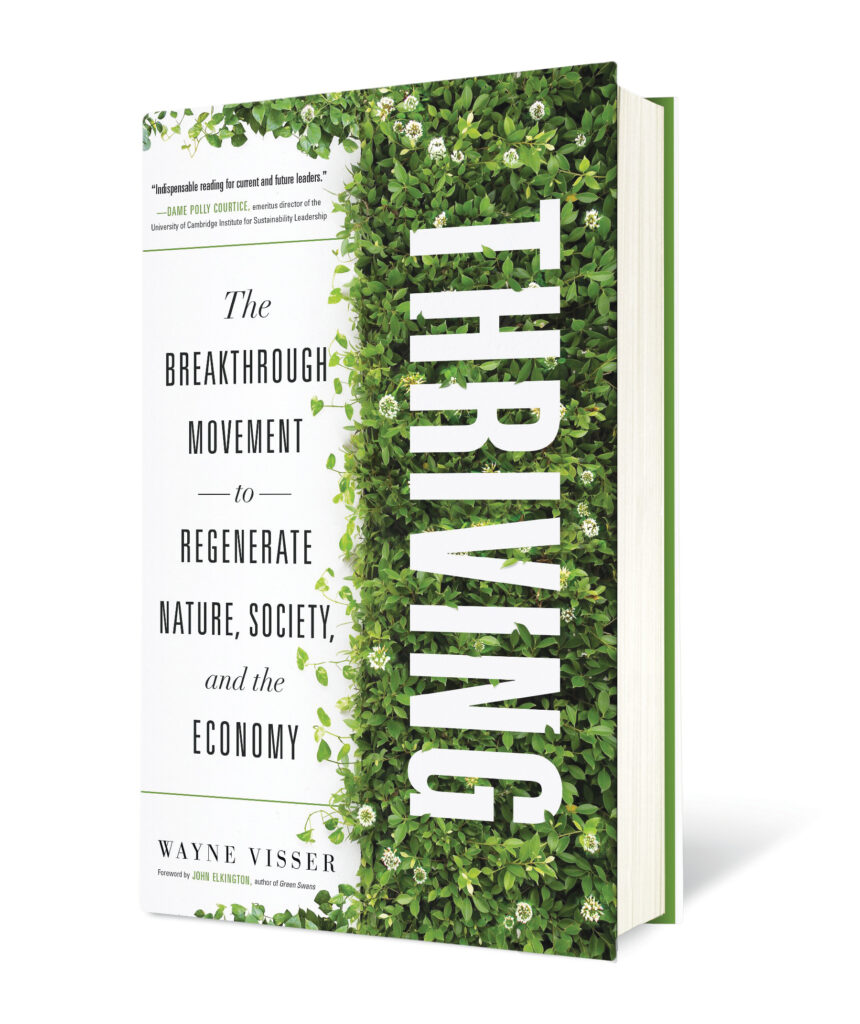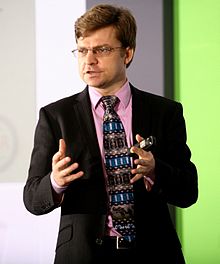
We are at a critical tipping point for human life on this planet. It is clear that humans have altered natural systems since the industrial revolution, and sustaining life on this planet requires behavior changes, but despite many years of urging society to think sustainably, we have yet to meet our goals. Why is it so hard to make the shifts necessary to save ourselves?
Author and sustainability academic at the University of Cambridge Wayne Visser has been actively working in sustainability for more than 30 years. He thinks one reason we continue to struggle to meet our goals is because sustainability as a message is merely an agenda for survival that is not well defined. Visser proposes we move away from thinking about sustainability to thinking about thriving. In an interview with Topanga New Times he said, “Thriving is reaching for a flourishing state… prosperity. If we are only aiming to sustain ourselves, then we are failing because we are simply not aiming high enough.”
In his new book, Thriving: The Breakthrough Movement to Regenerate Nature, Society, and the Economy, Visser uses catchy alliteration and his own poetry while offering new language to more accurately reflect our values. He shares many innovations in technology, government programs, green businesses, and the work of forward-thinking individuals that have been actively changing our world for the better.
While not denying that we are in a fight for our lives, Visser is optimistic because technology is accelerating a convergence in the renewable energy sector, in electrified transportation, in agriculture, and in science and medicine. The connectivity of many social movements is expanding. This convergence illuminates a path where nature, society, and the economy really can thrive. Visser discusses in detail the ways in which the economy is shifting from quantitative economic growth to a more connected, qualitative economic growth. “Everything starts out physically growing… think of a baby or of a tree,” he explains. “A baby at some point reaches its physical adulthood and then qualitative growth takes over and it’s all about learning from then on, or experience.”
Visser describes it as a “shift to an experiential economy and a service economy.”
“To measure qualitative growth, measurements such as the Happy Planet Index or the Social Progress Index are better gauges than the GDP.” We can keep our efforts aligned with our values by using metrics based on things such as ecosystem restoration, carbon sequestration, health and fulfillment, and biodiversity.”
Through technology, society has been finding new ways to share access to things, leading to what Visser calls “nownership”. Without needing to own a house, a car, or a tractor, we can share access through companies like Airbnb, Uber/Lyft, and HelloTractor in East Africa. “Expanding access reduces the barriers to ownership, improving the lives of many.”
“We simply have to give nature more space and more time,” Human activity is threatening ecosystems worldwide. In order to reverse the breakdown of ecosystems, Visser says “What we have been doing is crowding out nature in every way. We have been cutting the amount of space where we allow nature to operate… in the oceans and on the land. Anything we can do to give that space back, whether that’s rewilding, regenerative agriculture, or nature reserves, that will go a long way.”
Visser advocates for a plant-based diet and points out that much space can be reclaimed by changing the way we eat and farm. He said, “We use 60 percent of our agricultural land to grow two percent of the world’s protein.”
Biophilic design (incorporating nature into built environments) is another way to restore ecosystems. It can provide habitat for vital pollinators in urban areas while also giving people more exposure to nature which improves our health and well-being. Additionally, greening urban environments has been proven to aid in keeping buildings cool while also sinking carbon.
“Let me start by saying that we don’t need to change the world, we only need to change our world.”
“The nature thing is weird because we know intuitively that nature makes us happier and more satisfied,” says Visser. “We have plenty of science that tells us that nature is important for our health and it even impacts real estate prices, but we still just trade it off all the time.” He continues, “We trade it for more concrete, more farmland, more growth. People go visit nature and then go back to the grind. That’s such a crazy way of living if thriving is about being surrounded by things that are good for you and make you happy.”
When Visser was asked what we can do as individuals, he said, “Let me start by saying that we don’t need to change the world, we only need to change our world. The way that complex living systems work is that everything is connected. You just need to nudge and tweak and pull whatever you have influence over and it amplifies throughout the system. You may find that your little action is the thing that tips it over into a positive change.”
He added more comforting words, “Don’t get overwhelmed by the big system we have to change, just change what’s around you and what you have the power to influence.”
As we ‘nudge and tweak and pull’ the things around us, Visser advises thinking carefully about what we have influence over: what we buy, what we eat, where/how we work, and who we support.
“We can choose to have our household electricity come from renewable sources or whether or not to buy an electric car,” he says. “We can buy organic food and socially responsible clothing. Our food has a massive impact on our environment and our own health. In fact, one of the world’s top five solutions to the climate crisis is to switch to a plant-based diet.”
“Are you working for a purpose-driven company or organization that is improving society?”
Other choices such as fair-trade, organic, local, grass-fed, minimal packaging, etc., also benefit our collective cause.
“Work is how we spend our energy,” Visser says. “Are you working for a purpose-driven company or organization that is improving society? If you own your own business, in what ways are you ensuring that you have a positive social and environmental impact?”
Visser added, “Who you support is about how you vote, but also what social movement you support. Whether that’s Climate Strike, Black Lives Matter, or something else, it really matters which voice you’re amplifying by joining the movement.” In the attention economy, we all add value to whatever we give our attention to.

The pages of Thriving supply enough documented evidence of this breakthrough movement to be both fascinating and uplifting. In keeping with his optimistic outlook, Visser ended our interview with another reason for hope, “We all need to understand how complex living systems like societies change… I don’t think we understand it very well. We tend to think it’s a linear change or political change… like we have to get the majority of people agreeing…but it’s not. It’s more like viral change.”
Visser adds, “When you see the convergence that’s happening, the self-reinforcing trends… the technology, the policy, the market opportunities, the social movements… all of these accelerate each other. That’s the reason for hope: the positive tipping points are starting to happen.”




